|
Saturdee Opry
Links # 137: Familiar/Unfamiliar Edition
Don't know if it was the lack of sleep, or the overdose of sugar (don't ask),
but this edition was particularly arduous. The sacrifices I make for you! So. .
.today features five lesser-known arias from the verismo great, Ruggero
Leoncavallo, including a couple that are damn good (you guess which), annnnnnd.
. .five better-known arias, duets, and full-blown scenes, just to accommodate
the hummers and whistlers among you (that would include me.) A couple of extras
along the way, plus overture, and maybe later, an encore. Going to lie down now,
if the Giant Beardboys on scooters outside shut the fuck up. Salud.
Saturdee Opry Links Overture
"Zaza," by Leoncavallo.
https://www.youtube.com/watch?v=9o5dKq5SgQ4
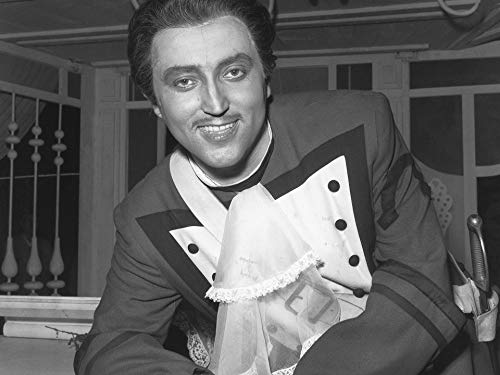
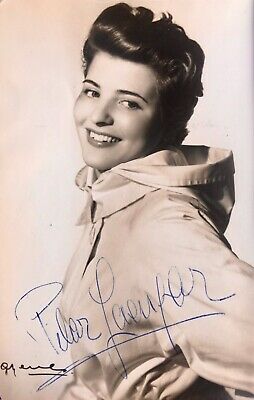
Wonderful Fritz Wunderlich
Pilar Lorengar

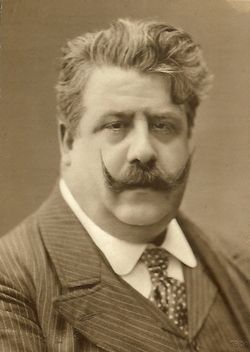
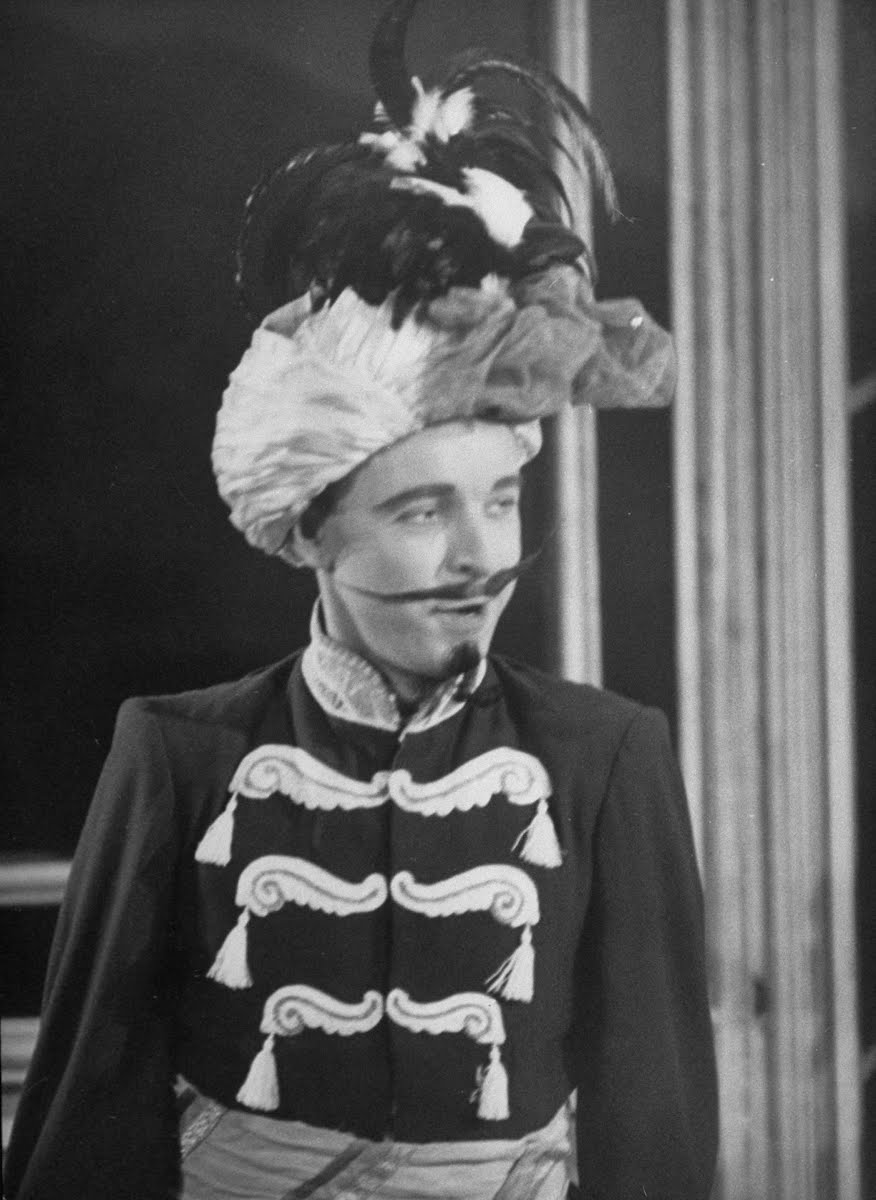
Pushkin
Leoncavallo and moustache
Petre Munteanu
1.
It's not such a tragedy to be famous for one thing. SOL, for example, is famous
only for chicken-sexing, and Ruggero Leoncavallo is known only for his great
opera, "Il Pagliacci," which is still a standard repertory 130 years after its
debut. Oh, wait, and of course, he wrote what might well be THE most beloved
Neapolitan song of all, "Mattinata!" Yet Leoncavallo also wrote ten other operas
and ten operettas, among other works, and one is the winning "Zaza," the tragic
story of a music hall star in love with a businessman who she doesn't realize is
married. Here is a gem of an aria from "Zaza," by Cascart, the heroine's
ex-lover: "Zaza piccola zingara," ("Zaza," you little gypsy!")---sung
magnificently by forgotten baritone Apollo Granforte (subject of previous SOL's.)
https://www.youtube.com/watch?v=7MGOqPg2bnk
Translation:
ITALIAN
Zazà, piccola zingara,
schiava d'un folle amore,
tu non sei giunta al termine
ancor del tuo dolore!
Quanto convien di lacrime
che sul tuo volto scenda
pria che il tuo solo ed umile
pellegrinar riprenda!
Tu lo credesti libero...
or la speranza è spenta...
Ora sei tu la libera,
e il tuo dover rammenta!
Ahi! del sognato idillio
sparve l'incanto a un tratto!
una manina d'angelo
indietreggiar t'ha fatto!
ENGLISH (approximate)
Zazà, little gypsy,
slave of a mad love,
you haven't come to an end
even of your pain!
How convenient of tears
that fall on your face
before yours alone and humble
love resume!
You thought him free ...
now hope is extinguished ...
Now you are the free one,
and you have to realize it
Oh! The charm disappeared suddenly
from the idyll
an angel's hand
pulled away!
SOL EXTRA!
The remarkable story of Apollo Granforte:
https://medicine-opera.com/2019/03/apollo-granforte/
2.
Leoncavallo's "Zaza" was a huge hit in its day, but is rarely performed now. It
premiered in 1900 in Milan, and received over 50 new productions in the next 20
years, then. . .pfffft. Why? Who knows. Certainly not the music. Here is
an aria sung by the married cad who allows himself to be seduced by Zaza in her
dressing room, without telling her he has a wife. She is smitten with him, and
it's downhill from there. You can hear the character's capriciousness, possibly
even sociopathy, in the melody, as well as a bit of "French-ness," seeing as it
is based on a French play---and the composer spent his early years visiting
French music halls. In essence, the fellow is describing in flowery terms
(Leoncavallo wrote the libretto) how irresistible he finds Zaza. "È un riso
gentile" ("It is a gentle laugh.") The tenor is a younger Roberto Alagna, and he
does a bang-up job.
https://www.youtube.com/watch?v=iQcSRP4mMzY
Translation:
ITALIAN
È un riso gentile
qual alba d'aprile
che inebria e conquide le fibre del cuor!
È un brivido arcano
se porge la mano,
e baldi si destano i sogni d'amor!
Soavi misteri
han gli occhi severi
e par che dischiudan del cielo il confin;
e l'anima oblìa
per dolce malìa:
al suon di sua voce, la vita, il destin!
Pur belle cotanto
ci passano accanto,
ma è lei che il destino ci impone adorar!
Chi folle d'amore
la strinse sul cuore
a lei sempre vinto dovrà ritornar!
È l'ebbro vicino
al nappo di vino.
Se fugge lontano resister potrà.
Se il nappo egli tocca,
se il porta alla bocca,
sin l'ultima goccia del nappo berrà!
ENGLISH (approximate)
It is a gentle laugh
what an April dawn
that intoxicates and conquers the fibers of the heart!
It's an arcane thrill
if he holds out his hand,
and bold dreams of love awaken!
Sweet mysteries
they have dark eyes
and it seems that the border of the sky opens up;
and the soul forgets
for sweet spell:
at the sound of this voice, life, destiny!
It is she that fate requires us to adore!
Crazy for love
he pressed his hand to his heart
but always will have to return to her!
He is the neighbor
with wine nappe.
If he flees far away he will be able to resist.
But if the tassel he touches,
if he brings it to his mouth,
ever the last drop of the nappo he will drink!
3.
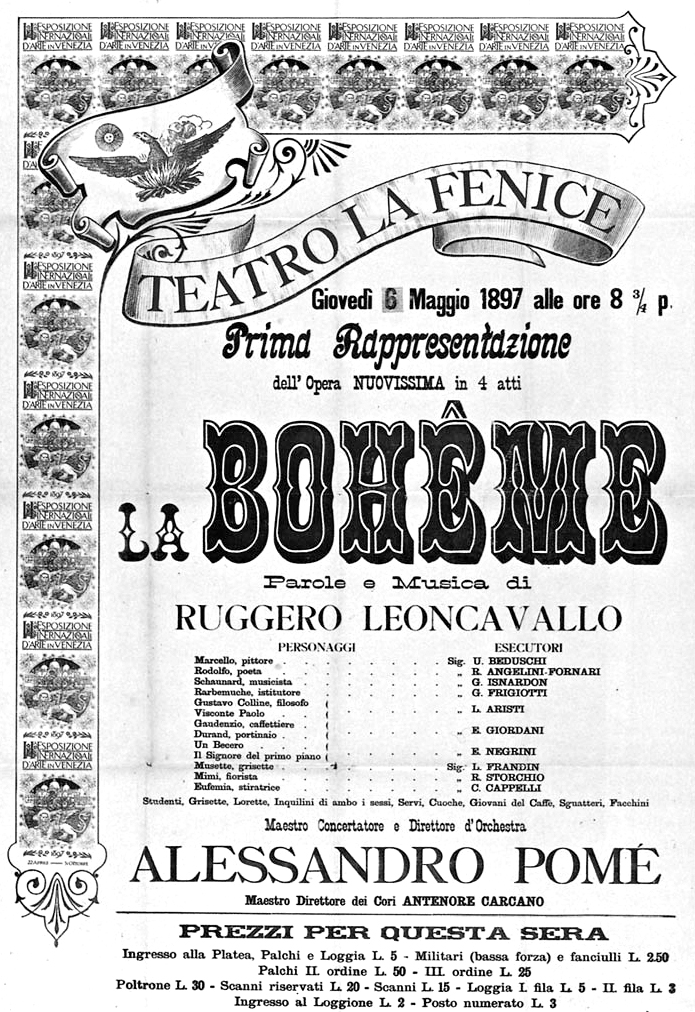
"La Boheme" is simultaneously the most beloved, and the most overshadowed---if
not forgotten---of all operas. Huh? Or course, I refer to Puccini's version in
the former, and Leoncavallo's in the latter. The composers worked simultaneously
on their respective "Boheme's," and after Puccini's premiered first, the
Leoncavallo specimen---while perfectly good---simply had no chance of success.
How does "good" compete with an opera where every single note is inspired,
captivating, ravishing? And yes, surprise, surprise, the two composers fell out
over the conflict. (Early on, Leoncavallo offered Puccini a completed libretto,
and Puccini, who claimed---probably falsely---that he was already working on "Boheme,"
rejected it.) There are several lovely arias in the Leoncavallo work, which
packs a melodramatic punch where Puccini's devastates with poetry and lyricism.
Here is the best known from the "other" Boheme, "Testa adorata." This is
hard-core verismo writing, meaning a style that does not skimp on realism and
naked outpouring of emotion. As you will see, or hear, in this electrifying live
radio performance by Mario Lanza. Verismo, in other words, is not subtle! This
is anguish-as-song, rather than a song that expresses anguish.
https://www.youtube.com/watch?v=AZ8aGF0Uyq8
Translation:
https://genius.com/Andrea-bocelli-musetta-testa-adorata-englisch-lyric
SOL EXTRA!
Leoncavallo vs. Puccini Smackdown!
How the two composers fell out over "La Boheme."
https://kmfa.org/pages/3133-how-ambition-and-rivalry-sparked-la-boheme
A good look at one of the great conflicts and stories in opera history. Puccini
was lying, which I find hilarious. Poor Leoncavallo went berserk. One Giorgio
Trevasan painted this scene of the argument between the two:
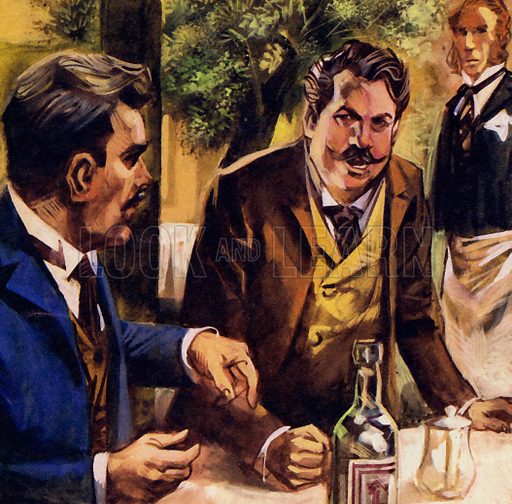
4.
You remember, of course, the glorious, hilarious, unbelievably lyrical, deeply
moving sequence in the Cafe Momus from Puccini's "Boheme." Poor Leoncavallo---he
just didn't have a chance. Someone wrote this facile quote about the two
composers: "this is the difference between talent and genius." Yet taken all by
itself, Leoncavallo's "Boheme" is a potent and compelling little opera, hardly
time wasted. Here is part of the Cafe Momus scene he wrote, just the little aria
(arietta), "Mimi Pinson, la biondinetta," as sung by Renee Fleming. Musetta
introduces Mimi to the rest of the gang (as near as I can tell, as I can't find
a translation.) "Mimi is the name of my sweet blonde." (Note: Leoncavallo
changed the name of his "Boheme" to "Mimi Pinson" after the success of Puccini's
work dwarfed his, but it since reverted to "La Boheme.")
https://www.youtube.com/watch?v=9jHIjOJm6Ok
Synopsis:
The innkeeper Gaudenzio tries in vain to eject the Bohemians, who never pay and
are continually up to no good. During the conversation another piece of
horseplay on their part is discovered. They sit down to dine, while Musette
gaily sings. (Canzonette: "Mimì is the name of my sweet blonde.") Naturally when
they are asked to pay the bill, they have no money. A comic fight ensues between
them and the innkeeper, who has called his servants to assist him. It is ended
by Barbemuche, who offers to pay the bill.
No translation available, but this might help, from a website somewhere:
In ‘Musette svaria sullaj bocca viva’, Mimì describes Musette’s beauty and
addiction to love to the revellers at Café Momus. Jaho doesn’t do playfulness
with quite the same panache that she does poignancy or passion; there’s not
quiet enough ‘sway’ in the voice, and as she trips through the jaunty phrases
there’s an occasional ‘edge’ to the tone, though when she opens up at the top
her soprano is glossy and full. Musette returns the favour, extolling her
friend’s charm and cheerfulness in ‘Mimì Pinson, la biondinetta’ (in the opera
she is joined at the close of the short aria by the full-throated bohemians).
5.
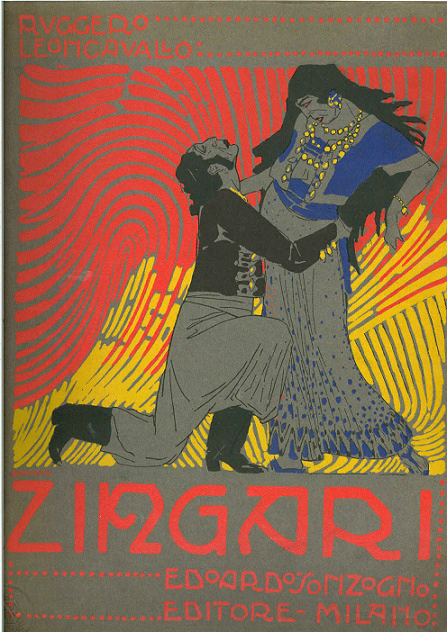
Finishing up SOL's brief look at lesser known Leoncavallo, here is an aria from
the opera, "Zingari" ("Gypsies"), a 1912 work based on---brace yourself, I know
this will come as a shock---a love triangle! It is almost never performed, not
because of the music, but because of the, uh, resolution. Get this: jealous Radu
locks his wife, Fleana, and her lover, Tamar, inside of the hut where they are
indulging in shameless carnal lust, and, uh. . .sets it on fire. Finis!
Gadzooks, eh? From burning passion to just plain burning. Guess that about wraps
things up! Anyhow, here is the rousing entrance aria sung by crazy Radu,
pre-murdering mania, here performed by Jose Carreras. "Dammi un amore." It's a
good one, though the words are (perhaps intentionally) insane. (If the writing
seems grandiloquent, that would make sense, seeing as the whole opera is based
on a poem by Pushkin.)
https://www.youtube.com/watch?v=NP3grhItO6k
Translation:
ITALIAN
Dammi un amore selvaggio e ribelle
purchè il mio cielo fiorisca di stelle!
Stracciami, dunque, la veste regale
e tienmi al carro che balza e traballa:
fuggo il mio regno ed il tuo mi abbarbaglia
ch' è sconfinato, turchino, immortale !
Già mi credevo padrone del mondo,
ma pel mio sogno altra strada non v' è
che quella aperta dal passo profondo
che ti consacra mio despota e re!
ENGLISH (approximate)
Give me wild and rebellious love
as long as my sky blooms with stars!
Tear me, therefore, the royal robe
and hold me to the chariot that leaps and wobbles:
I flee my kingdom and yours dazzles me
who is boundless, blue, immortal!
I already believed myself master of the world,
but for my dream there is no other way
than the one opened by the deep step
who consecrates you my despot and king!
About the opera:
https://en.wikipedia.org/wiki/Zingari
6.
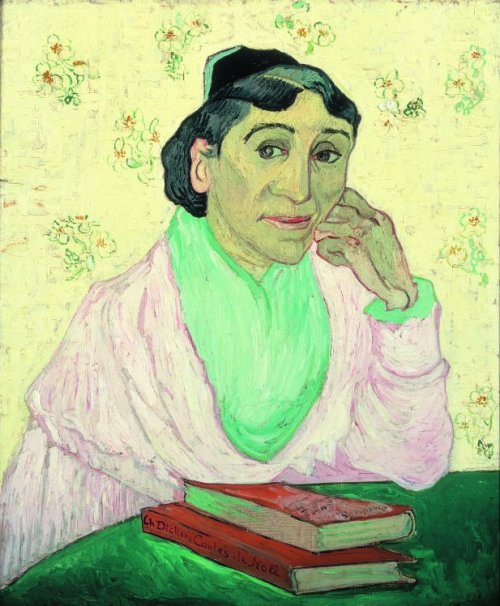
"L'Arlesienne," by Van Gogh
I know, I know. I've gotten 6,499 letters this morning alone, viciously
demanding to know why I spend time on lesser known material. I'm so sorry to
inflict this on you, as I know it is more challenging than proven, popular fare.
I will endeavor to compensate now, if you will forgive me, with the remainder of
today's SOL presentation. "E la solita storia," better known as "Federico's
Lament" ("Lamento di Federico"), from Cilea's opera, "L'Arlesiana" ("The Girl
from Arles") is usually sung with muscle, power, maximum angst. Not here. The
forgotten Romanian tenor, Petre Munteanu, treats it strictly with poignancy and
lyric beauty. Novel.
https://www.youtube.com/watch?v=I3iiyJj_mUQ
Setting: on the banks of Vacares pond in the region of Camargue, the end of May,
late 1800's, Italy
Synopsis: Federico has run away from home after finding out that his beloved
girl from Arles has betrayed him with the stable boy. He is found by Baldassarre
and L'Innocente but the former leaves to tend the flocks and the latter falls
asleep. As L'Innocente falls asleep, he mentions a line from a story told
earlier about a goat. This comment sets off Federico and he despairs over his
lost love.
About Munteanu:
https://en.wikipedia.org/wiki/Petre_Munteanu
7.
"Tales of Hoffman" is a massive beast of an opera, really a series of short
stories---some of them quite wacky---with a through-line. Poor Offenbach never
wrestled the beast to completion; that task was left to others. Even today, it
is performed with different components, in varying order. At up to five hours or
so, this brute can be demanding on one's hindquarters, yet is redeemed by many a
winning musical moment. Here is the most loved of all, certainly, the exquisite
"Barcarolle." Told you I was giving you some crowd-pleasers. "Time flies and
does not return." (When you're having fun.) Note Kate Lindsay's mellifluous,
dark mezzo. The soprano is Ekaterina Gubanova. With English subtitles. Also
note: I am not responsible for the ladies getting ready for gynecological exams.
https://www.youtube.com/watch?v=kpnzUG6OrfU
Translation:
https://lyricstranslate.com/en/barcarolle-barcarolle.html
Synopsis:
A gallery in a palace, Venice. The act opens with the barcarolle "Belle nuit, ô
nuit d'amour" – "Beautiful night, oh night of love". Hoffmann falls in love with
the courtesan Giulietta, and thinks she returns his affections ("Amis, l'amour
tendre et rêveur" – "Friends, tender and dreamy love"). Giulietta is not in love
with Hoffmann, but seducing him under the orders of Captain Dapertutto, who
promises her a diamond if she steals Hoffmann's reflection from a mirror ("Scintille,
diamant" – "Sparkle, diamond").
Saturdee Opry Links will return after this word from our
sponsor.
https://www.youtube.com/watch?v=MbJTa3hITPc
8.
You know it, you love it, you can't live without it, you poor bastards. Your
iPhone. But there is also this, which is an excellent reason to put the goddamn
things down for few minutes and listen: the love duet from Puccini's "Madame
Butterfly." But this is not just any rendition, kids, it's an especially
winning, even gripping pairing of the elegant Spanish soprano, Pilar Lorengar,
and the fairly incomparable German tenor, Fritz Wunderlich. Yes, it's in German,
though you probably won't notice, such is the overwhelming power of Puccini's
music. If you find yourselves muttering, "My God," at times, rest assured you
aren't alone. First of all, there is the almost incomprehensible beauty of the
music. How could anyone have written something so enthralling, tender, gorgeous,
moving? Damned if I know. Then there is the electrifying voice of Wunderlich
against the purity of Lorengar, just, well, words fail me. (Thanks, BONNIE TONE,
and Les Poules d'opéra, for sending this.)
Synopsis:
Pinkerton is a callow lieutenant in the U.S. Navy who, upon landing in Japan,
becomes insanely infatuated with a poor teenaged girl, Cio Cio-San, or
"Butterfly." She is equally smitten with the "exotic" man from the other side of
the world, and, well, if the energy from such attractions could be harnessed,
there would be no more need for fossil fuels. They spend a single night
together, right after this duet, then Pinkerton leaves for America. You know the
rest: Butterfly gives birth to a son, and waits faithfully for several years for
Pinkerton to return, her actions having made her an outcast in society. When
Pinky finally does come back, it's with a wifey-poo, the bastard, and Butterfly
catches the Last Train to Clarksville, via a bit of knife-wielding. But for a
moment here, with this duet, they know bliss.
https://www.youtube.com/watch?v=JT9xqnO9Ab4
Translation:
Go to this link, search for "Vogliatemi," start there.
http://www.murashev.com/opera/Madama_Butterfly_libretto_English_Italian
Note: I don't know a C6 from seasick, so you're on your own. Suffice to say that
the note comes at the very end of the duet.
About poor Fritz Wunderlich:
https://en.wikipedia.org/wiki/Fritz_Wunderlich
9.
One "hit" love duet deserves another. Puccini wrote "Tosca" after "Boheme," but
before "Butterfly." Each opera has terrific "love duets," although "Butterfly"
probably represents his epitome of the form. The duet from act one of "Tosca" is
well in the same ballpark, though. Here are Placido Domingo and Hildegarde
Behrens, in a ravishing Zeffirelli production that puts you right where you are
supposed to be (as opposed to an executive board room, a hospital ward, or the
moon, as so many modern productions idiotically do.) Start at 6:55, if you don't
care to see the whole sequence. That would be the tenor aria, "Qual occhi al
mondo puo" or "What eyes in the world," leading to the duet. If you DO want to
watch the full sequence, see below for translation.
https://www.youtube.com/watch?v=dLjnHFhmufU
Synopsis:
Tosca enters the church and suspiciously asks Cavaradossi what he has been doing
– she thinks that he has been talking to another woman. Cavaradossi reassures
her and Tosca tries to persuade him to take her to his villa that evening: "Non
la sospiri, la nostra casetta" ("Do you not long for our little cottage"). She
then expresses jealousy over the woman in his painting, whom she recognises as
the Marchesa Attavanti. Cavaradossi explains the likeness; he has merely
observed the Marchesa at prayer in the church. He reassures Tosca of his
fidelity and asks her what eyes could be more beautiful than her own: "Qual'occhio
al mondo" ("What eyes in the world").
Translation:
FULL SEQUENCE---go to the link and search for the words, "perche chiuso."
ABBREVIATED SEQUENCE (6:55)---go to the link and search for "quale occhio."
http://www.murashev.com/opera/Tosca_libretto_Italian_English
About Ms. Behrens:
https://www.nytimes.com/2009/08/20/arts/music/20behrens.html
FINAL BOW:
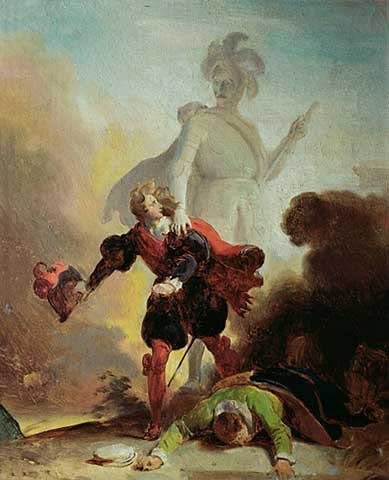
Il Commendatore drags Don down
(painting by Alexandre-Evariste Fragonard)
Mozart really knew how to write a finale---usually employing a multi-part genius
interweaving of voices, culminating with full chorus, and often containing "the
moral of the story." He knew how to send 'em home satisfied, he did. But in "Don
Giovanni," Wolfgang really put the "final" into "finale." What, after all, is
more final than being dragged down to the smoking, sulphury grottos of hell? (As
another Don, Trump, is bound to find out.) Ladies, especially the metoo
contingent, must find this sequence especially fulfilling! The womanizing
scoundrel, Don Juan, "gets his"---courtesy of a giant statue come to life!
Right, it could almost be an old Universal horror picture, at least the ending.
Background: the statue is of a beloved local figure, a commendatore, Don Pedro,
whose daughter was either raped or seduced by Giovanni. When Don Pedro
confronted Giovanni over this fiendish assault, Giovanni killed him in a duel. A
statue was erected in his memory. And here is that ending, with Franz-Josef
Selig as the statue of Il Commendatore, and Carlos Alvarezas as Giovanni. With
English subtitles. (A great production, by the way!)
https://www.youtube.com/watch?v=RzQMtnjiceY
BUT WAIT---THERE'S MORE!
What was I saying about Mozart operas ending with multi-voice "moral of the
story" wrap ups? Right. After Giovanni is shaking hands with Old Scratch, the
rest of the characters gather to sum everything up. Go to 2:50:00.
https://www.youtube.com/watch?v=S45p2jTAXCM
Saturdee Opry Links Encore!
Back to Leoncavallo. I mentioned earlier that one of his crowing achievements
was a single song, "Mattinata," which is deeply loved the world over. Get this:
it was the first song ever written for The Gramophone Company, later known as
EMI. Here is a stupendous rendition by a guy named Mario. "The dawn, dressed in
white, has already opened the door to the sun. . ."
https://www.youtube.com/watch?v=bIs8FEMhKrU
About the song, translation:
https://en.wikipedia.org/wiki/Mattinata_
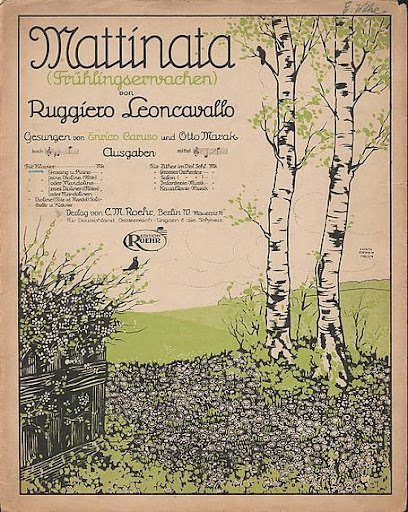
Back to Opera Links
Back to Home Page
|



